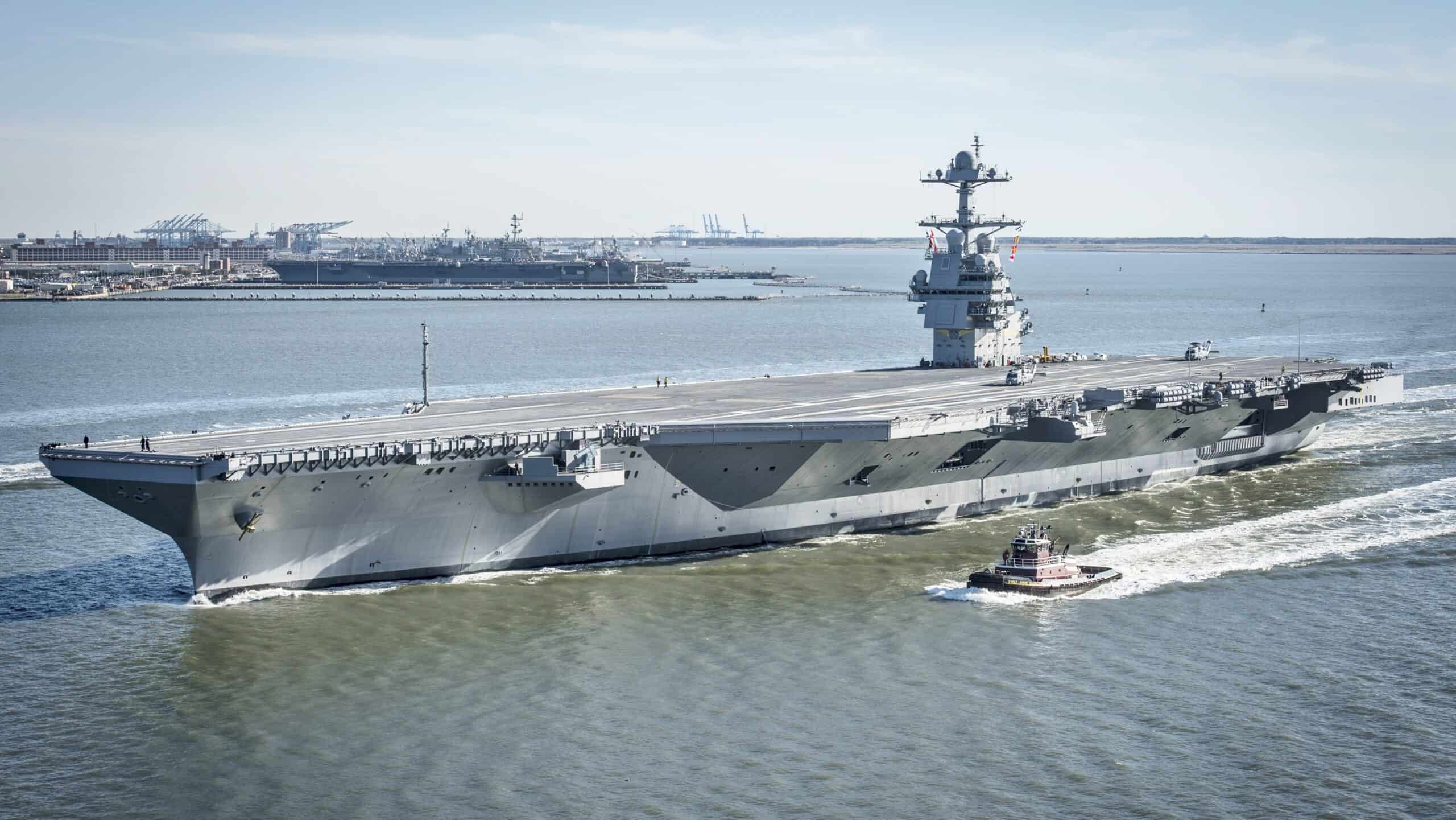
After the First World War, the development and production of aircraft carriers were put on hold with the Washington Naval Treaty of 1922. Also known as the Five-Power Treaty, signed by the United States, France, Japan, the United Kingdom, and Italy, it intended to prevent an arms race and limited the production of aircraft carriers, battleships, and battlecruisers. By the 1930s, Japan and Italy refused to sign amended treaties and Germany would no longer adhere to them, setting the stage for the Second World War.
Since their inception, aircraft carriers have been integral components of the United States Navy and have only increased in importance and firepower over the years. Their distinct history demonstrates how the Navy has continually redefined nautical warfare since World War II, which is when the importance of these ships became evident.
The most decorated ship in the U.S. Navy was the USS Enterprise, an aircraft carrier that responded to the attack on Pearl Harbor and played a pivotal role in the Pacific War during multiple battles, some of which were the Battle of the Philippine Sea and the Battle of Leyte Gulf, assisting in causing immense damage to the Japanese Navy. (See the most highly decorated U.S. Navy ships of WWII.)
After World War II, there was a shift in aircraft carrier design, with an emphasis on larger vessels to accommodate the increasing size and capabilities of aircraft. The Midway-class carriers came into existence in the 1940s, and eventually, the first supercarrier, the USS Forrestal, was commissioned in 1955.
The nuclear age introduced the Nimitz-class carriers, marking a revolution in fuel sources. Today, the United States is comprised of two aircraft carrier classes – the Nimitz-class and the Gerald R. Ford-class, which entered the fleet in 2017. The Nimitz-class is the second-largest carrier in the world, with the Ford-class taking the top spot. With lengths of between 1,092 ft and 1,106 ft, it is the largest in the world. (Here are U.S. Navy ships that are being decommissioned and when.)
The United States Navy is fitting out one new Gerald Ford-class carrier, CVN-79 John F. Kennedy, scheduled for completion in 2025. Three additional Ford-class carriers are currently under construction – CVN-80 Enterprise, CVN-82 Dorris Miller, and the yet-to-be-named CVN-82 scheduled for completion in 2028, 2032, and 2034 respectively.
Here are the newest aircraft carriers in US Navy history.
1. CV-34 Oriskany
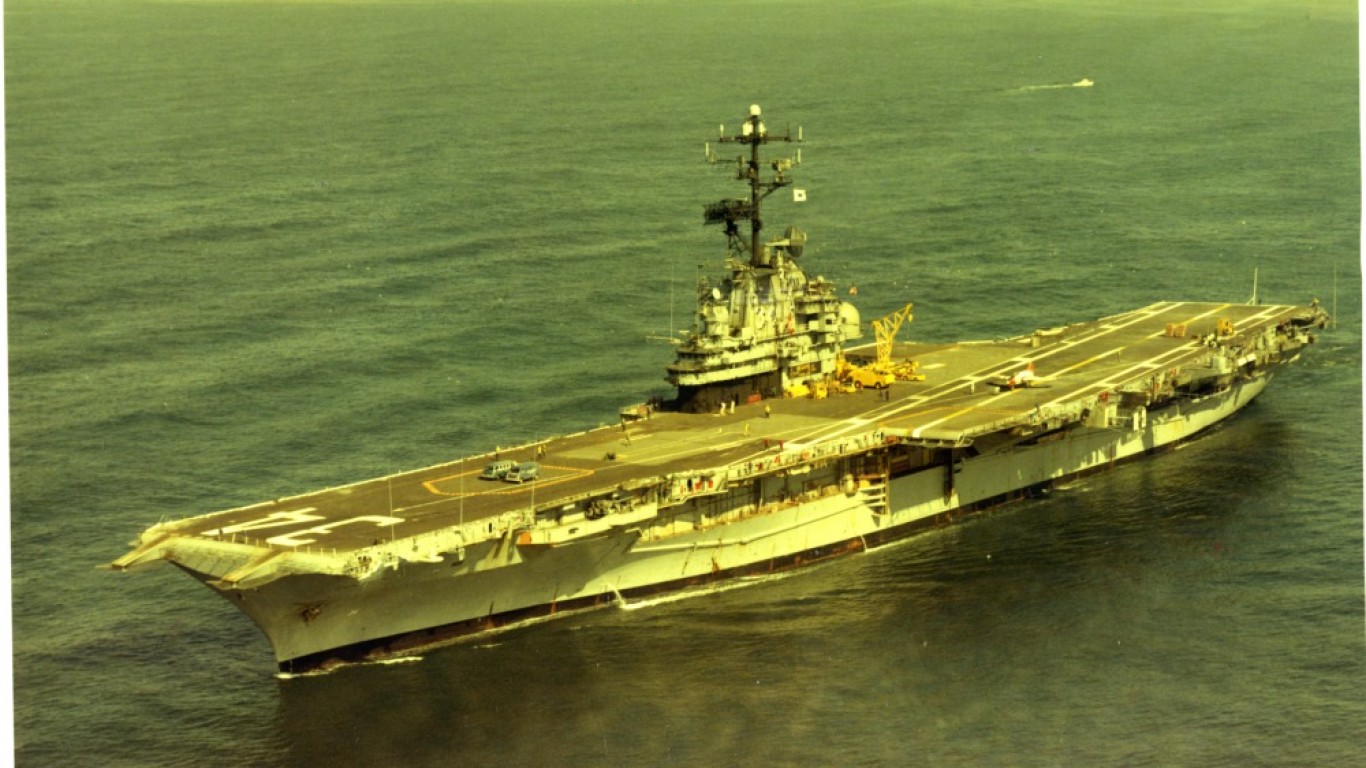
- Class: Essex (extended bow)
- Commissioned: September 25, 1950
- Service life: 28 years, 11 months, and 26 days
- Status: Scuttled as an artificial reef in the Gulf of Mexico in 2006
2. CV-36 Antietam

- Class: Essex (extended bow)
- Commissioned: January 28, 1945
- Service life: 18 years, 3 months, and 10 days
- Status: Scrapped in 1974
3. CV-37 Princeton
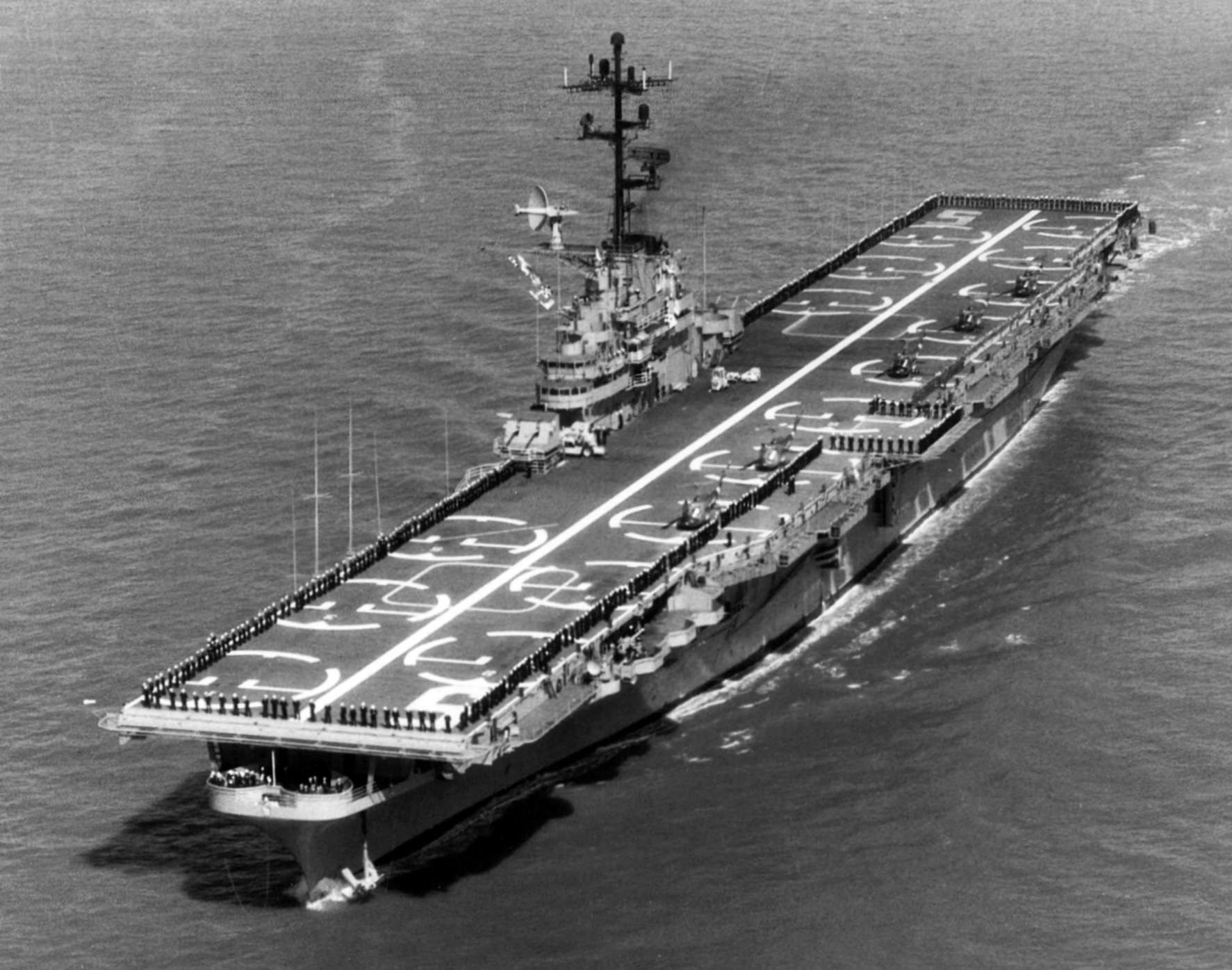
- Class: Essex (extended bow)
- Commissioned: November 18, 1945
- Service life: 24 years, 2 months, and 12 days
- Status: Scrapped in 1971
4. CV-38 Shangri-la
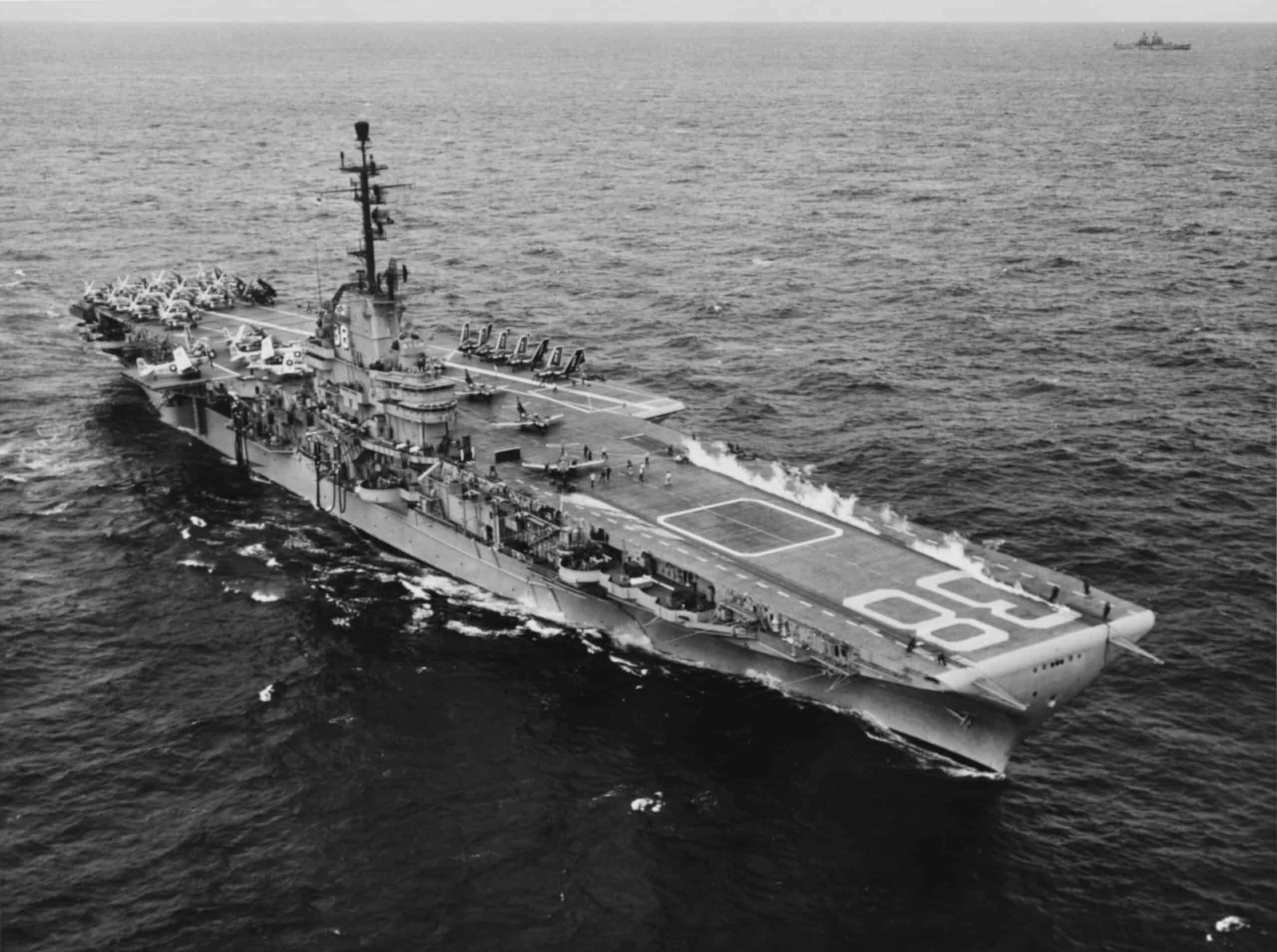
- Class: Essex (extended bow)
- Commissioned: September 15, 1944
- Service life: 26 years, 10 months, and 15 days
- Status: Scrapped in 1988
5. CV-39 Lake Champlain
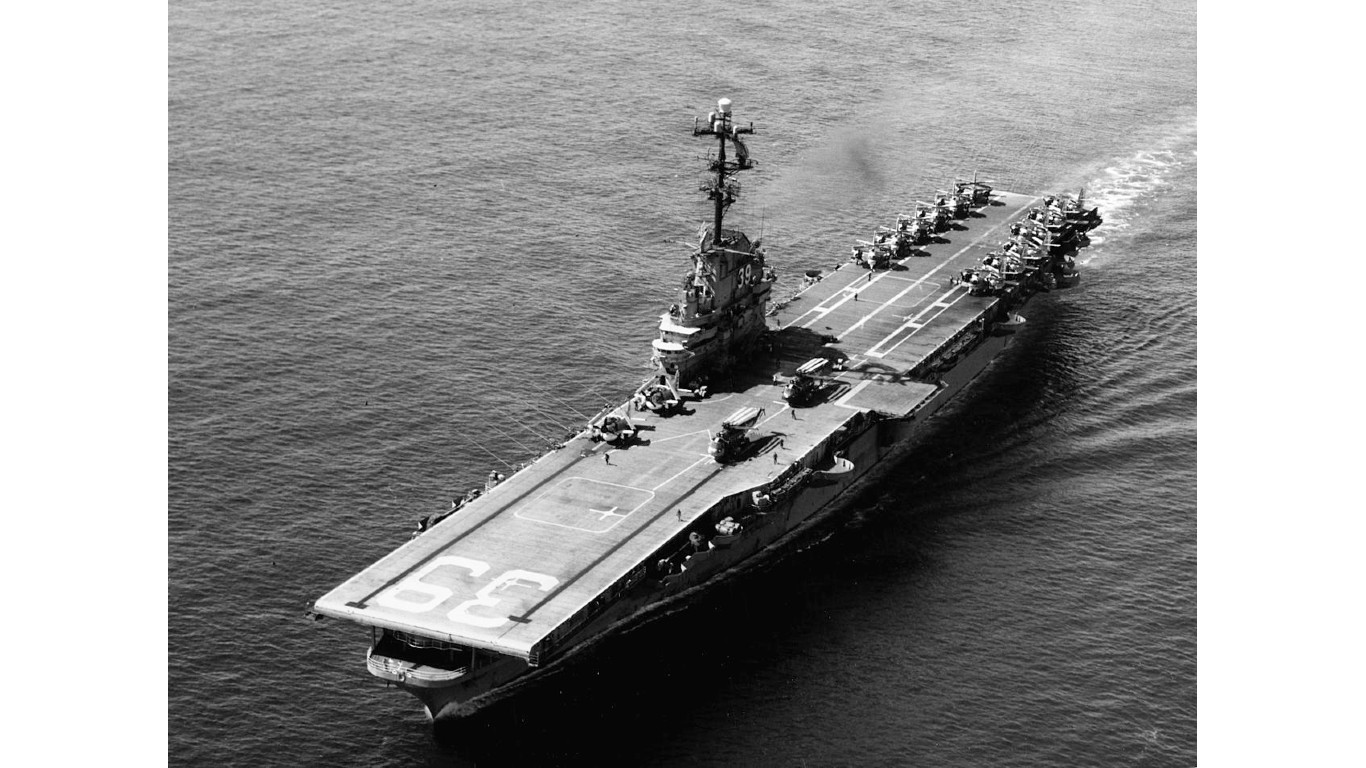
- Class: Essex (extended bow)
- Commissioned: July 3, 1945
- Service life: 20 years, 9 months, and 29 days
- Status: Scrapped in 1972
6. CV-40 Tarawa
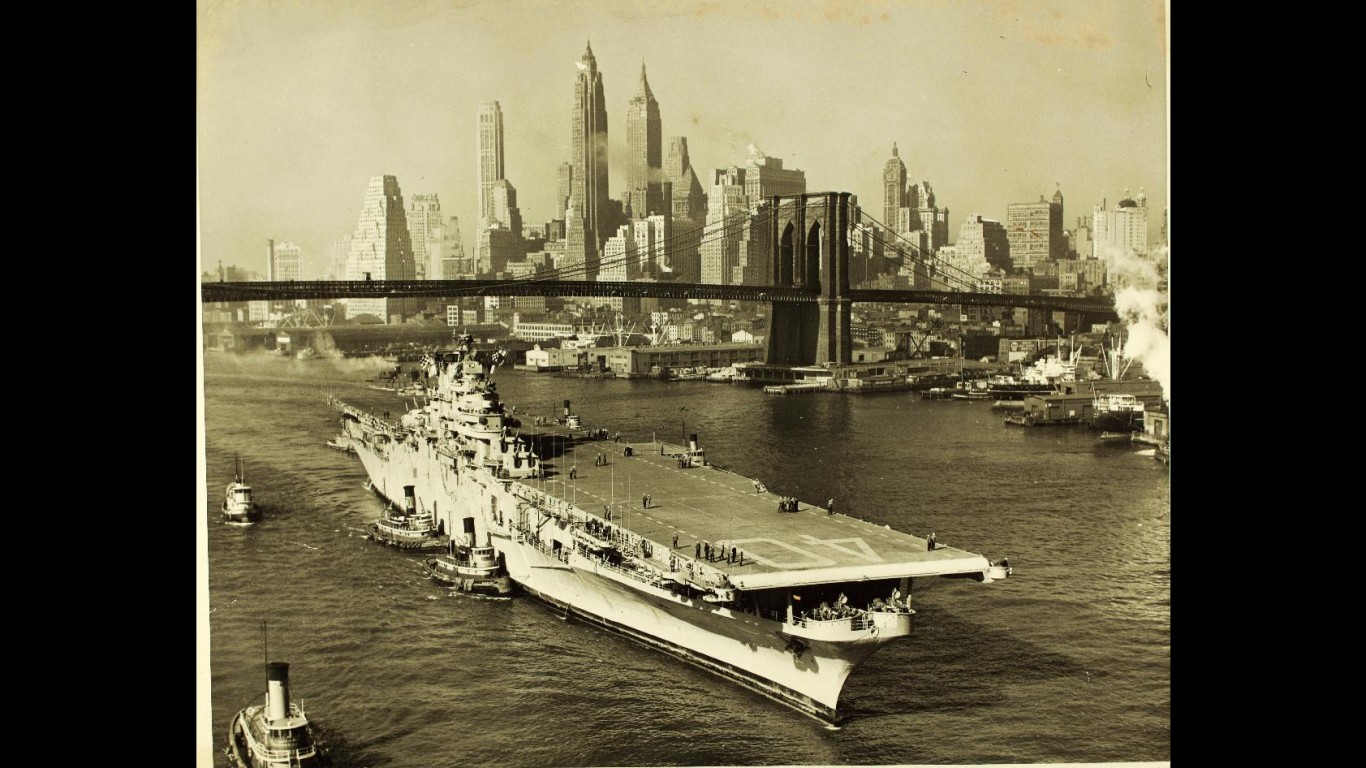
- Class: Essex (extended bow)
- Commissioned: December 8, 1945
- Service life: 14 years, 5 months, and 5 days
- Status: Scrapped in 1968
7. CVB-41 Midway

- Class: Midway
- Commissioned: September 10, 1945
- Service life: 46 years, 7 months, and 1 day
- Status: Preserved at the USS Midway Museum–San Diego, California
8. CVB-42 Franklin D. Roosevelt
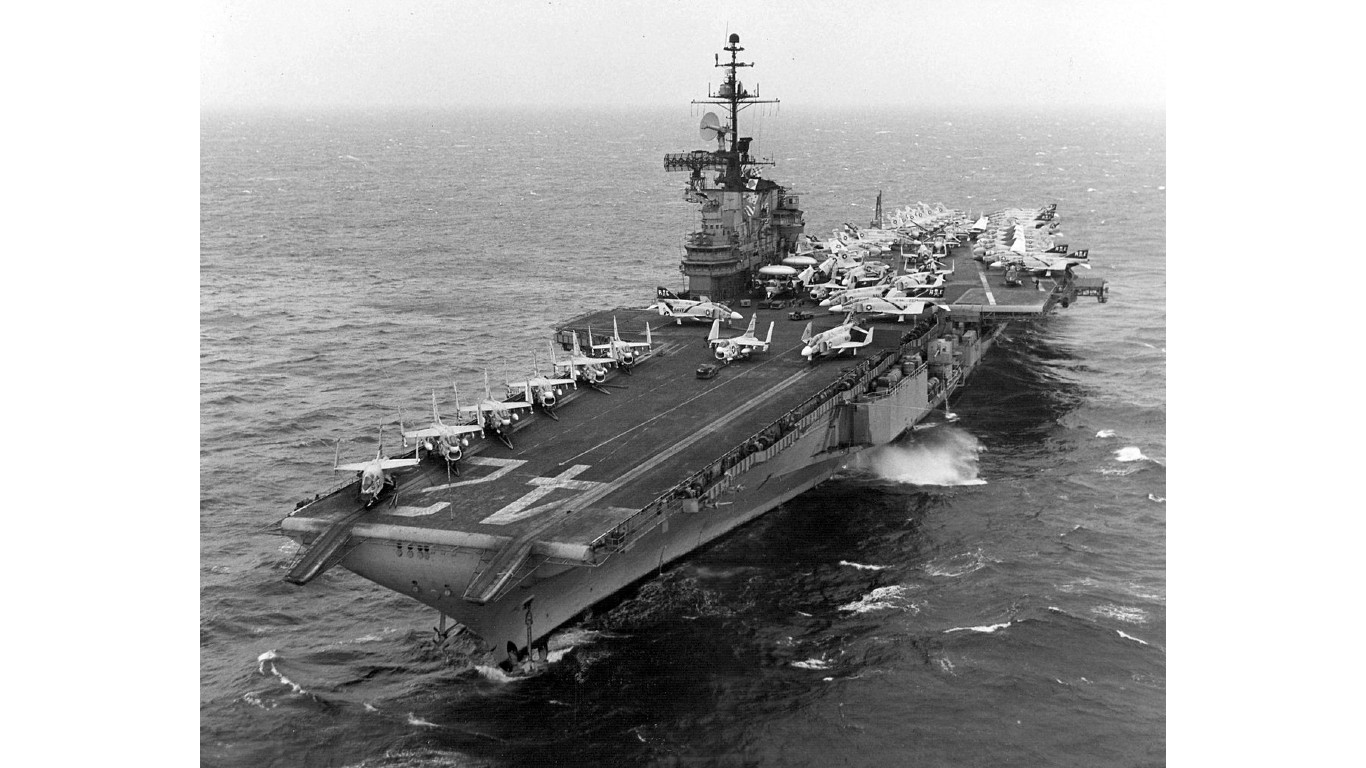
- Class: Midway
- Commissioned: October 27, 1945
- Service life: 31 years, 11 months, and 4 days
- Status: Scrapped in 1978
9. CVB-43 Coral Sea

- Class: Midway
- Commissioned: October 1, 1947
- Service life: 42 years, 6 months, and 25 days
- Status: Scrapped in 1993
10. CV-45 Valley Forge
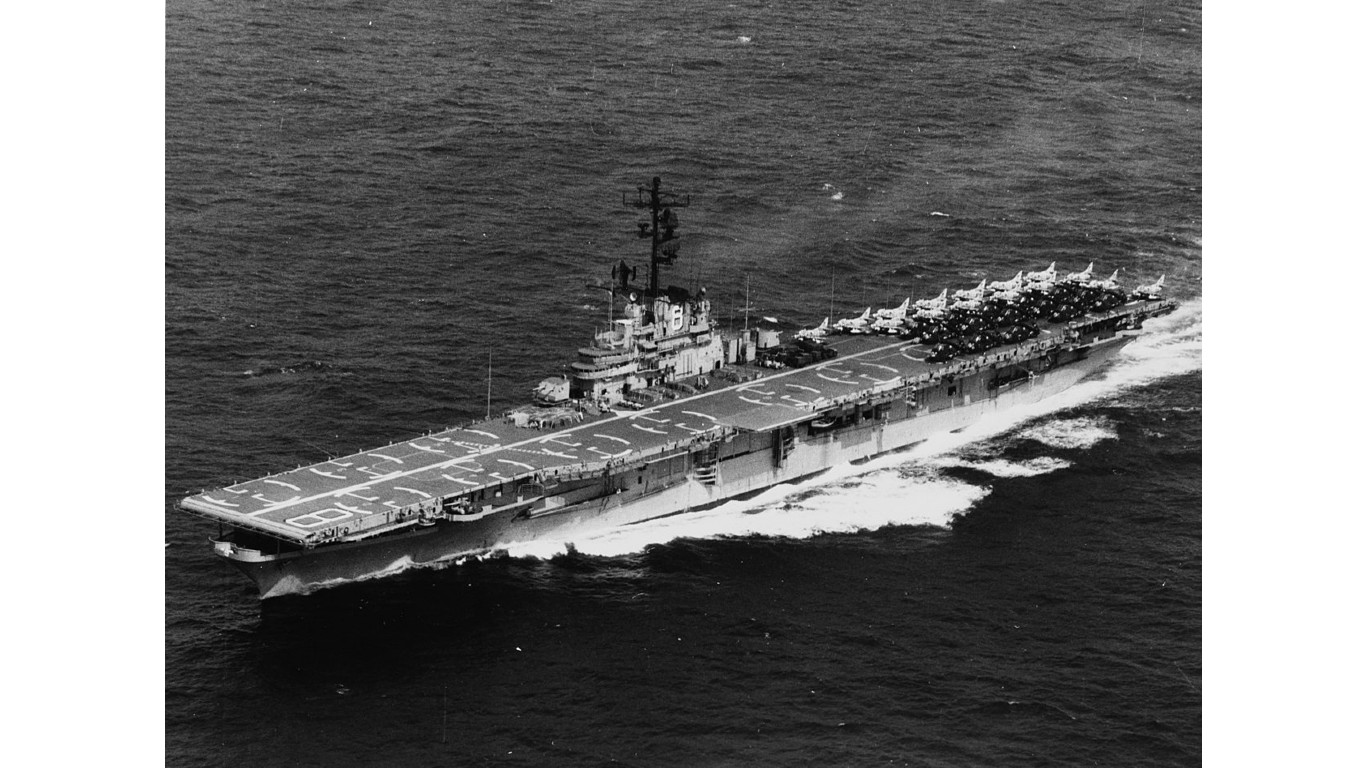
- Class: Essex
- Commissioned: November 3, 1946
- Service life: 23 years, 2 months, and 12 days
- Status: Scrapped in 1971
11. CV-47 Philippine Sea
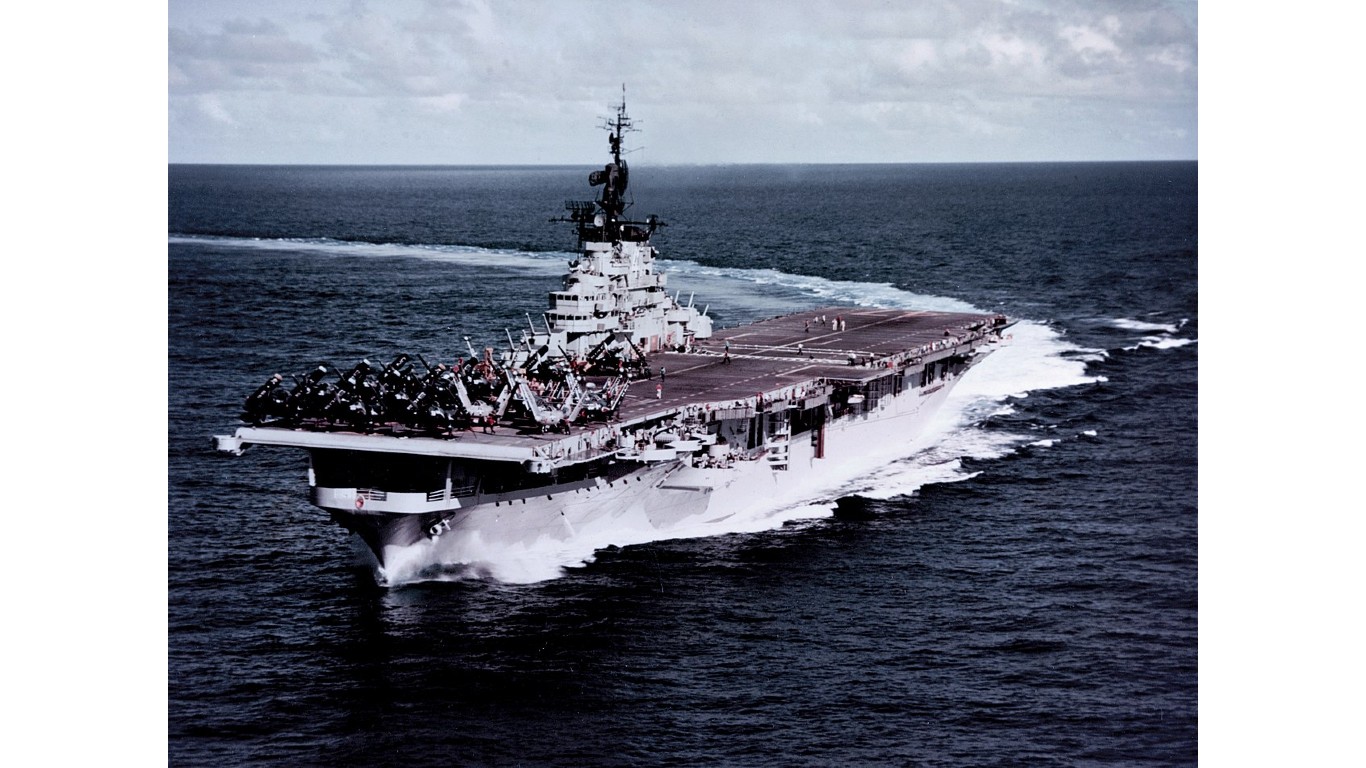
- Class: Essex (extended bow)
- Commissioned: May 11, 1946
- Service life: 12 years, 7 months, and 17 days
- Status: Scrapped in 1971
12. CV-48 Saipan
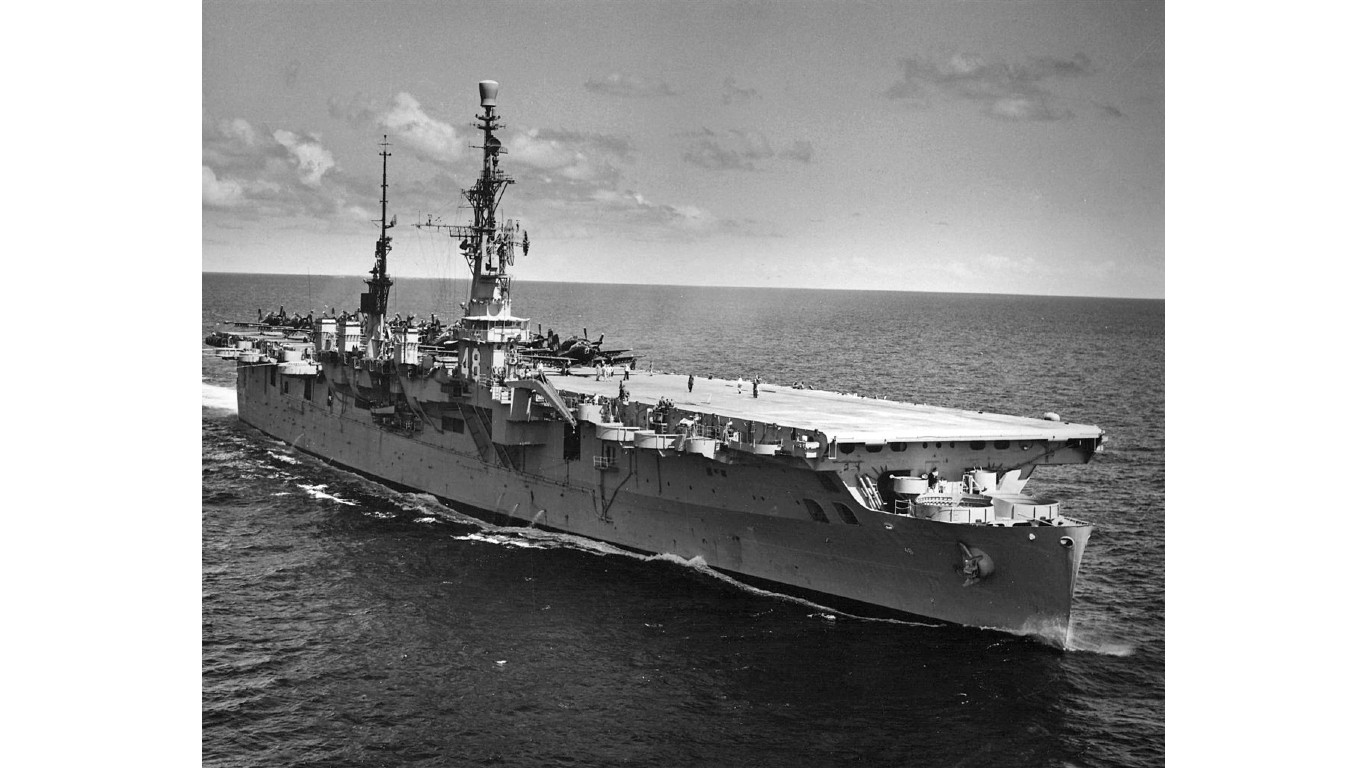
- Class: Saipan
- Commissioned: July 14, 1946
- Service life: 23 years and 6 months
- Status: Scrapped in 1976
13. CVL-49 Wright
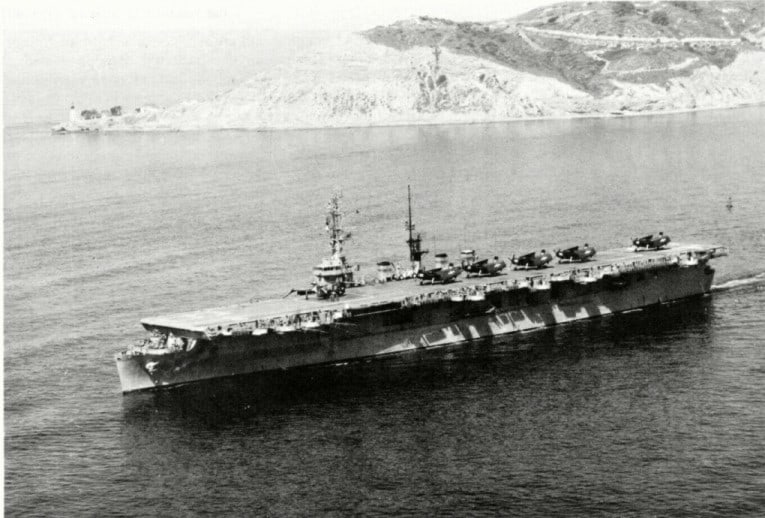
- Class: Saipan
- Commissioned: February 9, 1947
- Service life: 9 years, 1 month, and 6 days
- Status: Scrapped in 1980
14. CV-59 Forrestal
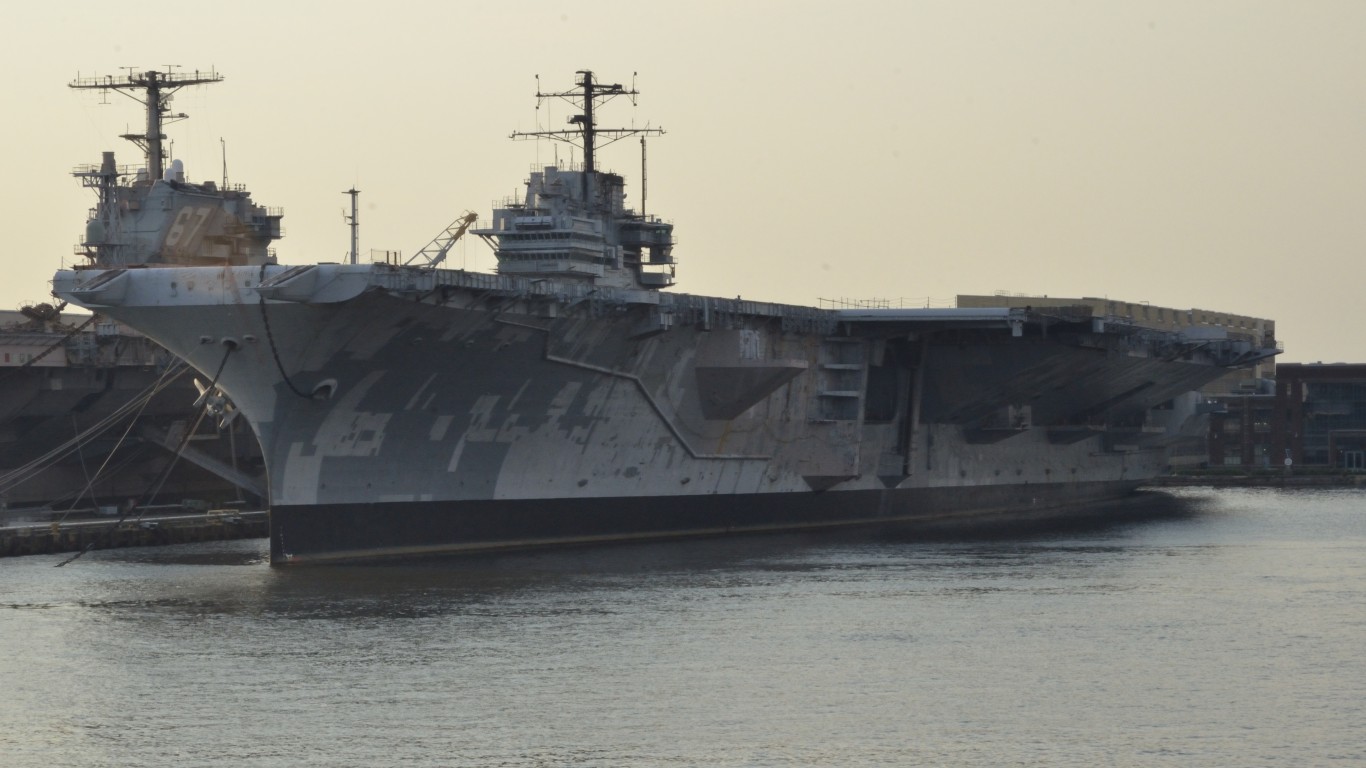
- Class: Forrestal
- Commissioned: October 1, 1955
- Service life: 37 years, 11 months, and 29 days
- Status: Scrapped in 2014
15. CV-60 Saratoga

- Class: Forrestal
- Commissioned: April 14, 1956
- Service life: 38 years, 4 months, and 6 days
- Status: Scrapped in 2015
16. CV-61 Ranger
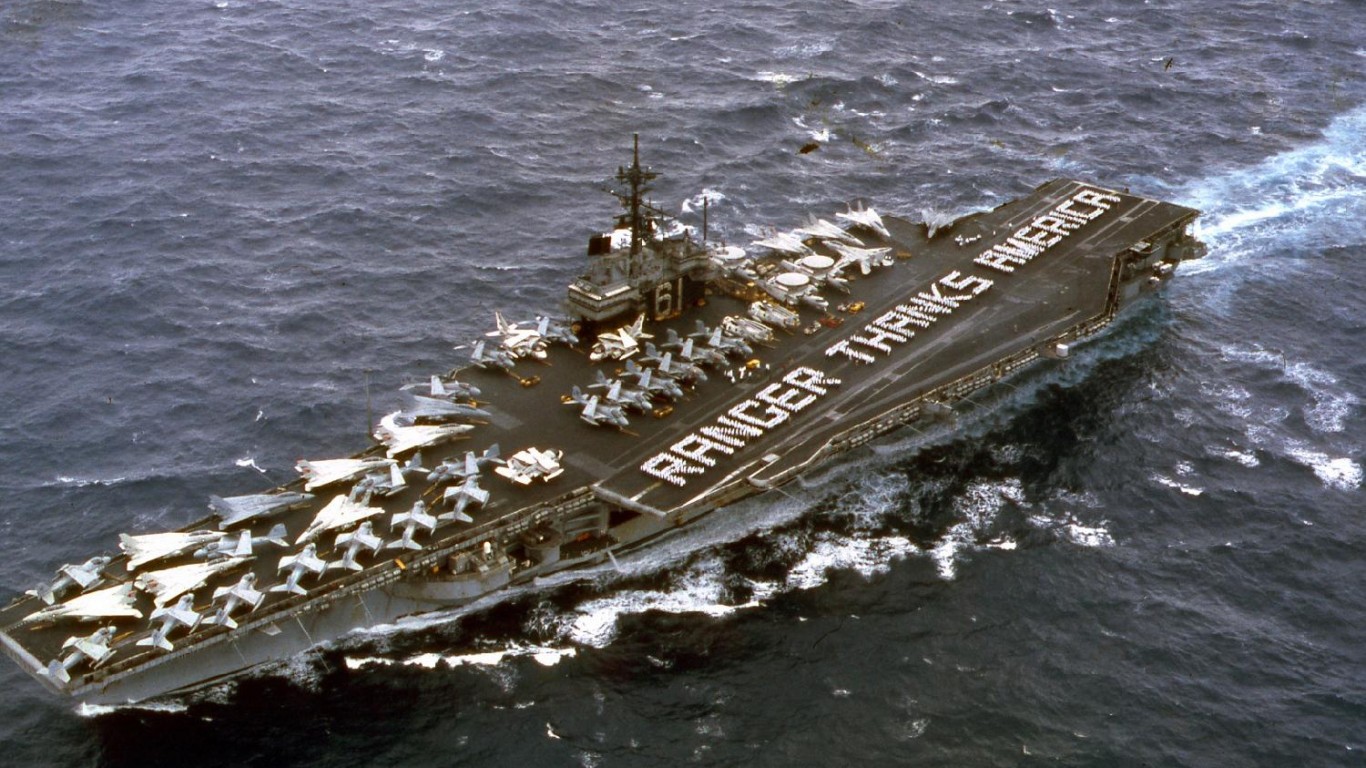
- Class: Forrestal
- Commissioned: August 10, 1957
- Service life: 35 years and 11 months
- Status: Scrapped in 2017
17. CV-62 Independence
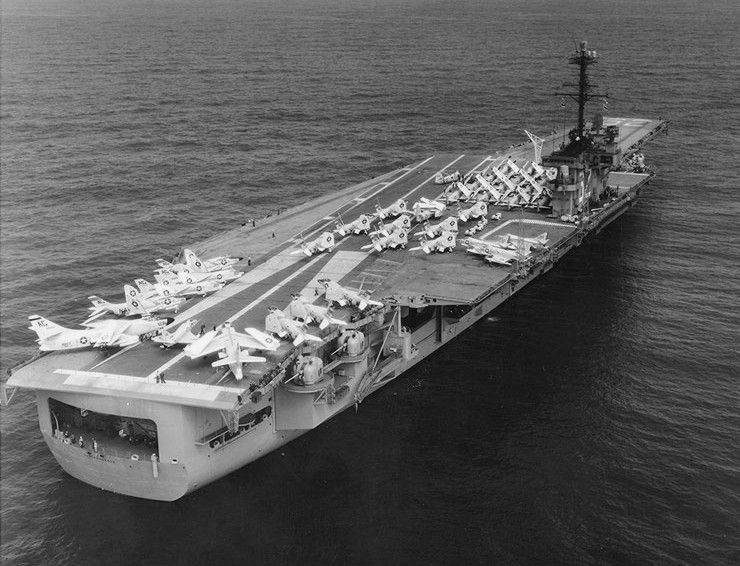
- Class: Forrestal
- Commissioned: January 10, 1959
- Service life: 39 years, 8 months, and 20 days
- Status: Scrapped in 2018
18. CV-63 Kitty Hawk
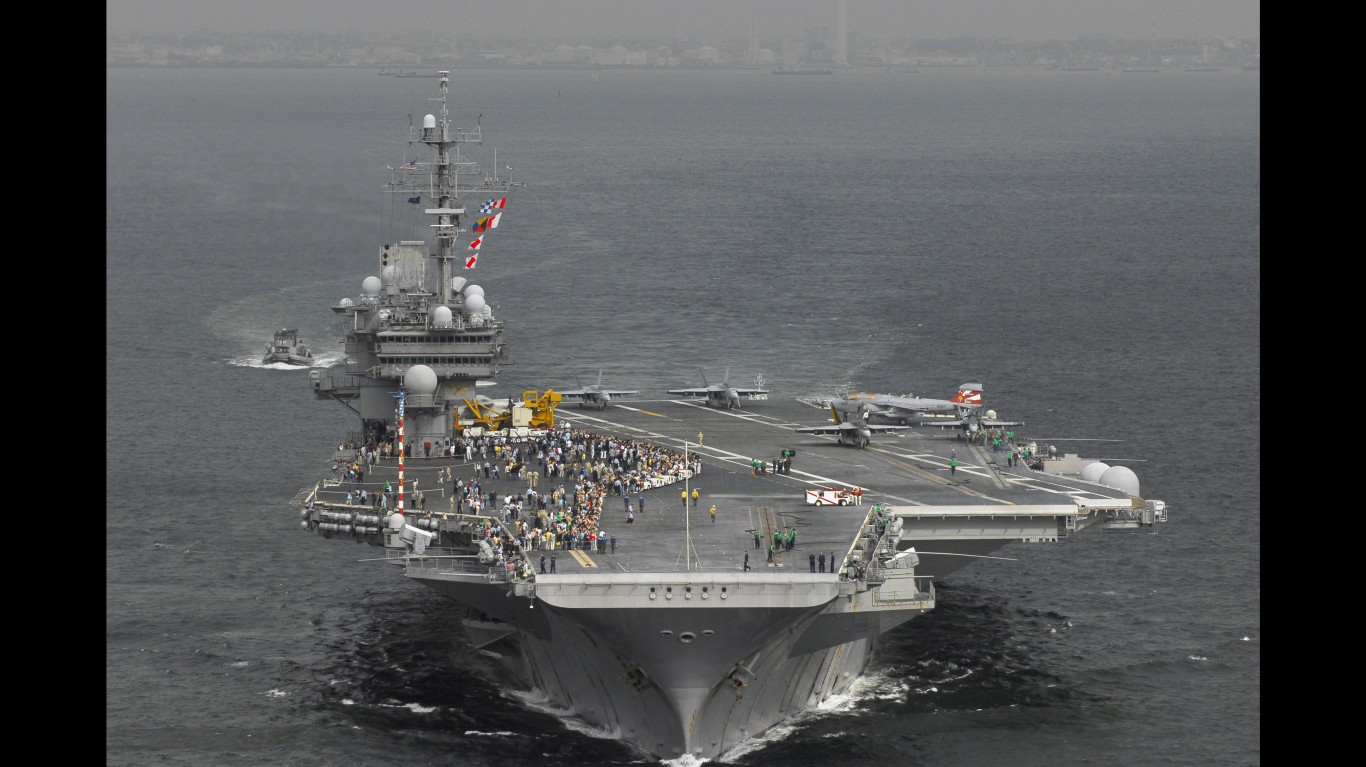
- Class: Kitty Hawk
- Commissioned: April 29, 1961
- Service life: 48 years and 13 days
- Status: Designated for scrapping
19. CV-64 Constellation

- Class: Kitty Hawk
- Commissioned: October 27, 1961
- Service life: 41 years, 9 months, and 11 days
- Status: Scrapped in 2015
20. CVN-65 Enterprise
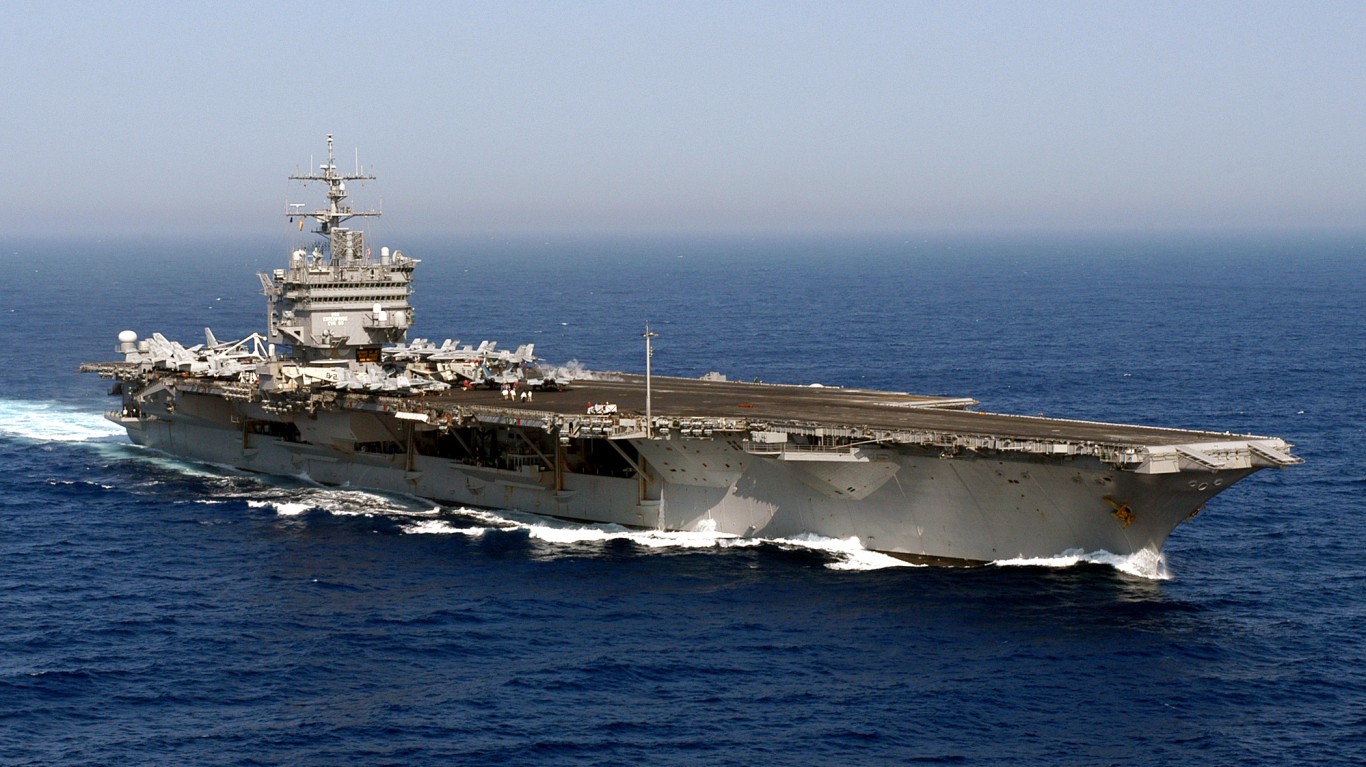
- Class: Enterprise
- Commissioned: November 25, 1961
- Service life: 55 years, 2 months, and 9 days
- Status: Scrapped in 2017
21. CV-66 America
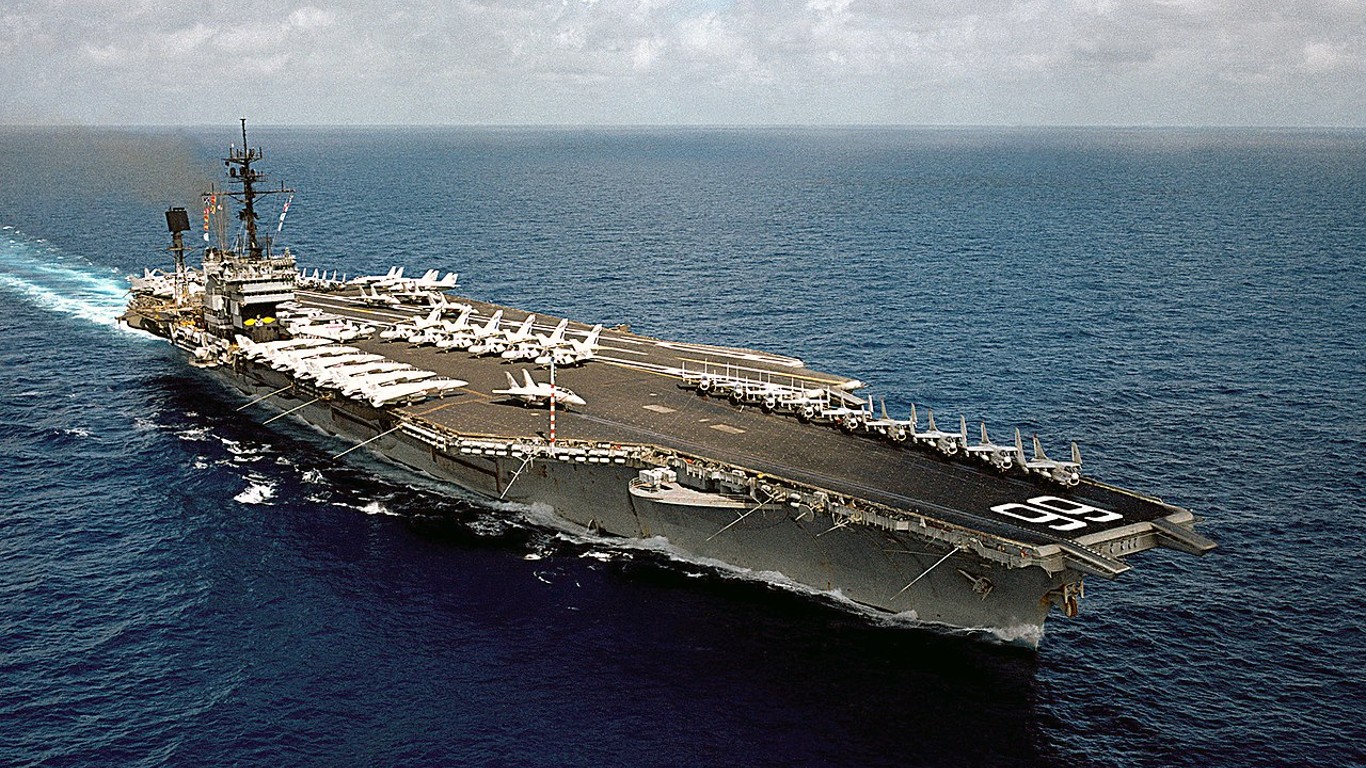
- Class: Kitty Hawk
- Commissioned: January 23, 1965
- Service life: 31 years, 6 months, and 17 days
- Status: Sunk as a target in 2005
22. CV-67 John F. Kennedy
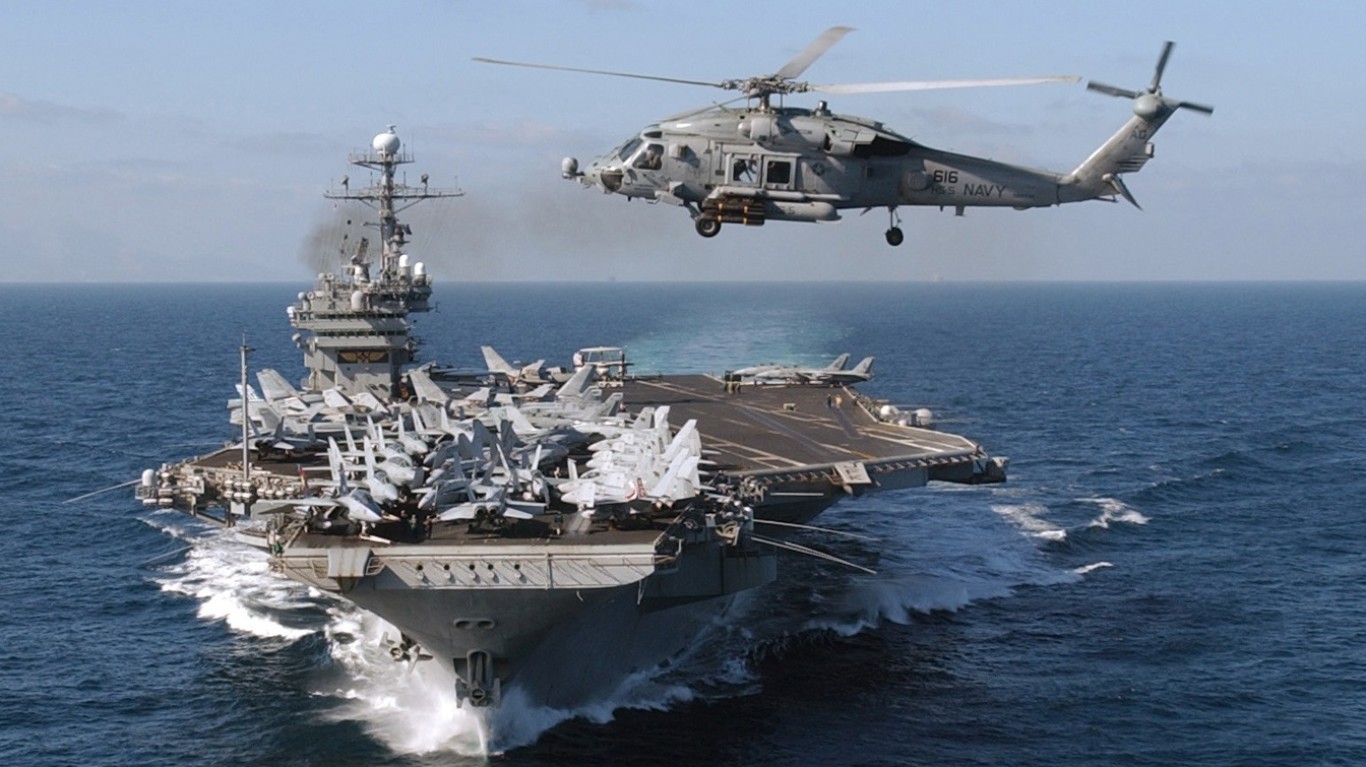
- Class: John F. Kennedy
- Commissioned: September 7, 1968
- Service life: 38 years, 6 months, and 16 days
- Status: Designated for scrapping
23. CVN-68 Nimitz
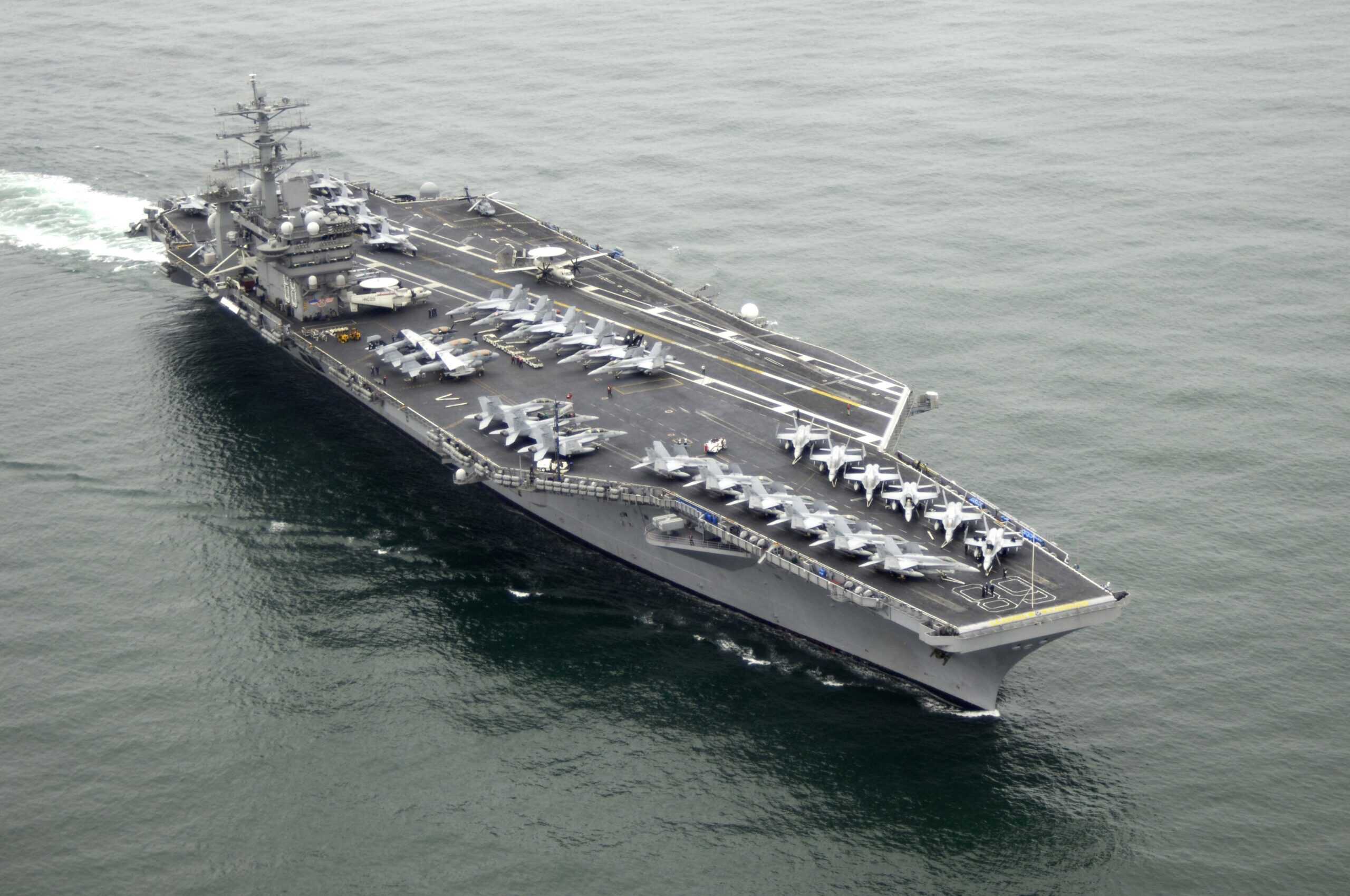
- Class: Nimitz
- Commissioned: May 3, 1975
- Service life: 48 years, 2 months, and 15 days
- Status: Stationed at Naval Base Kitsap, Bremerton, Washington
24. CVN-69 Dwight D. Eisenhower
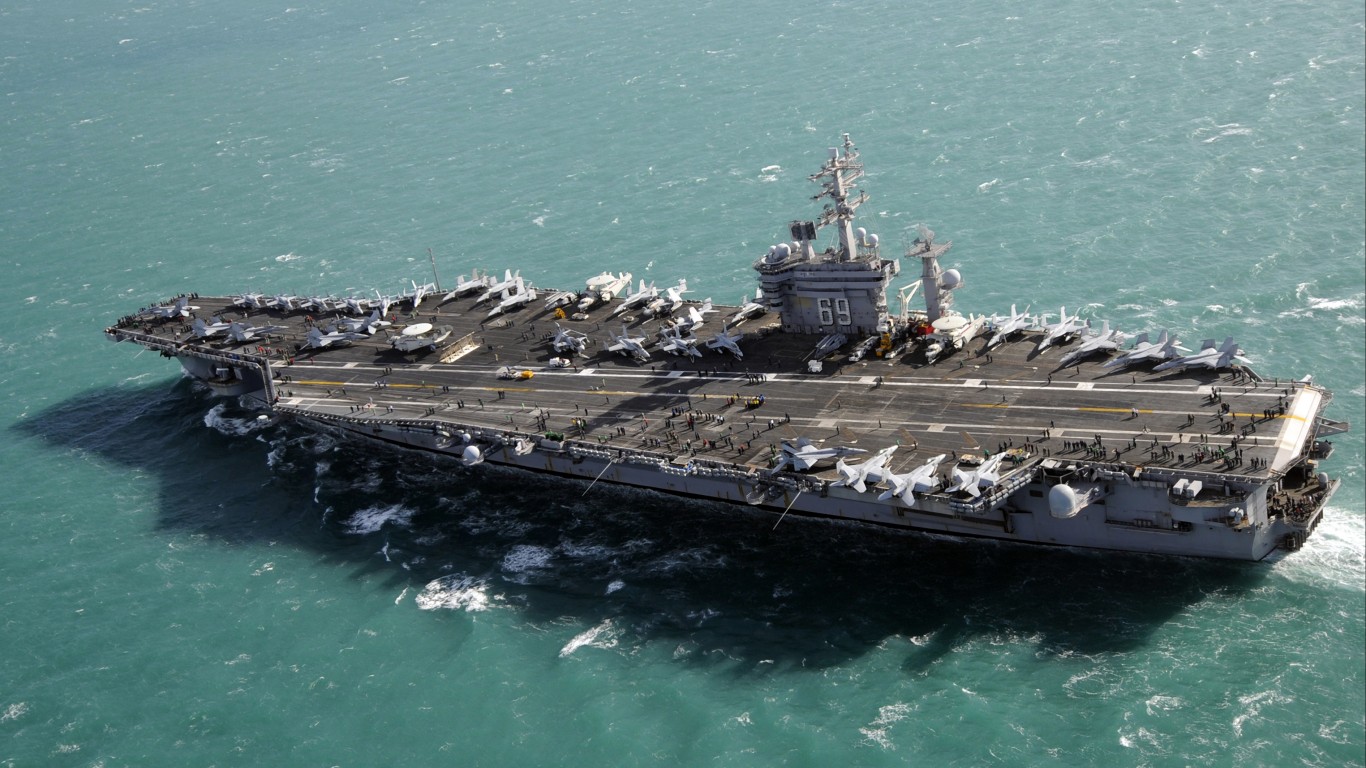
- Class: Nimitz
- Commissioned: October 18, 1977
- Service life: 45 years, 9 months, and 1 day
- Status: Stationed at Naval Station Norfolk, Norfolk, Virginia
25. CVN-70 Carl Vinson
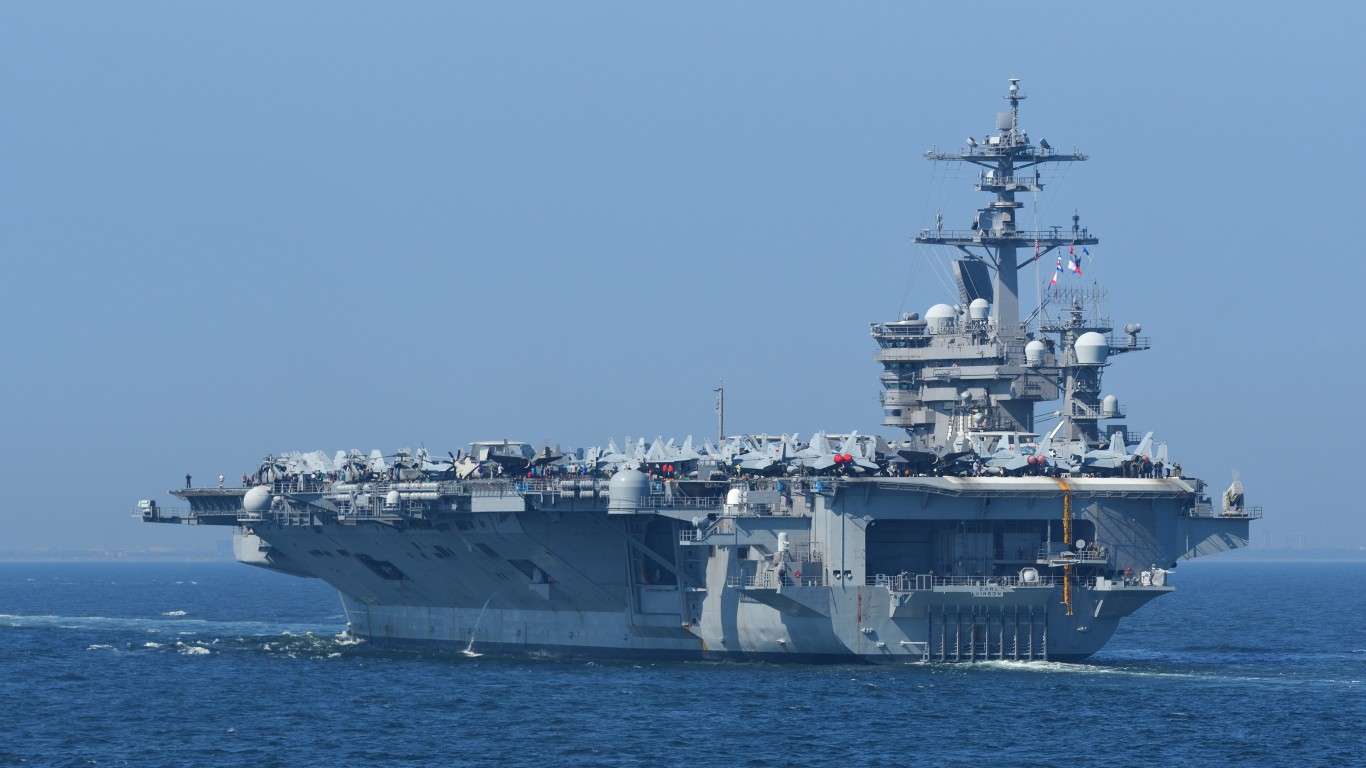
- Class: Nimitz
- Commissioned: March 13, 1982
- Service life: 41 years, 4 months, and 5 days
- Status: Stationed at Naval Air Station North Island, San Diego, California
26. CVN-71 Theodore Roosevelt
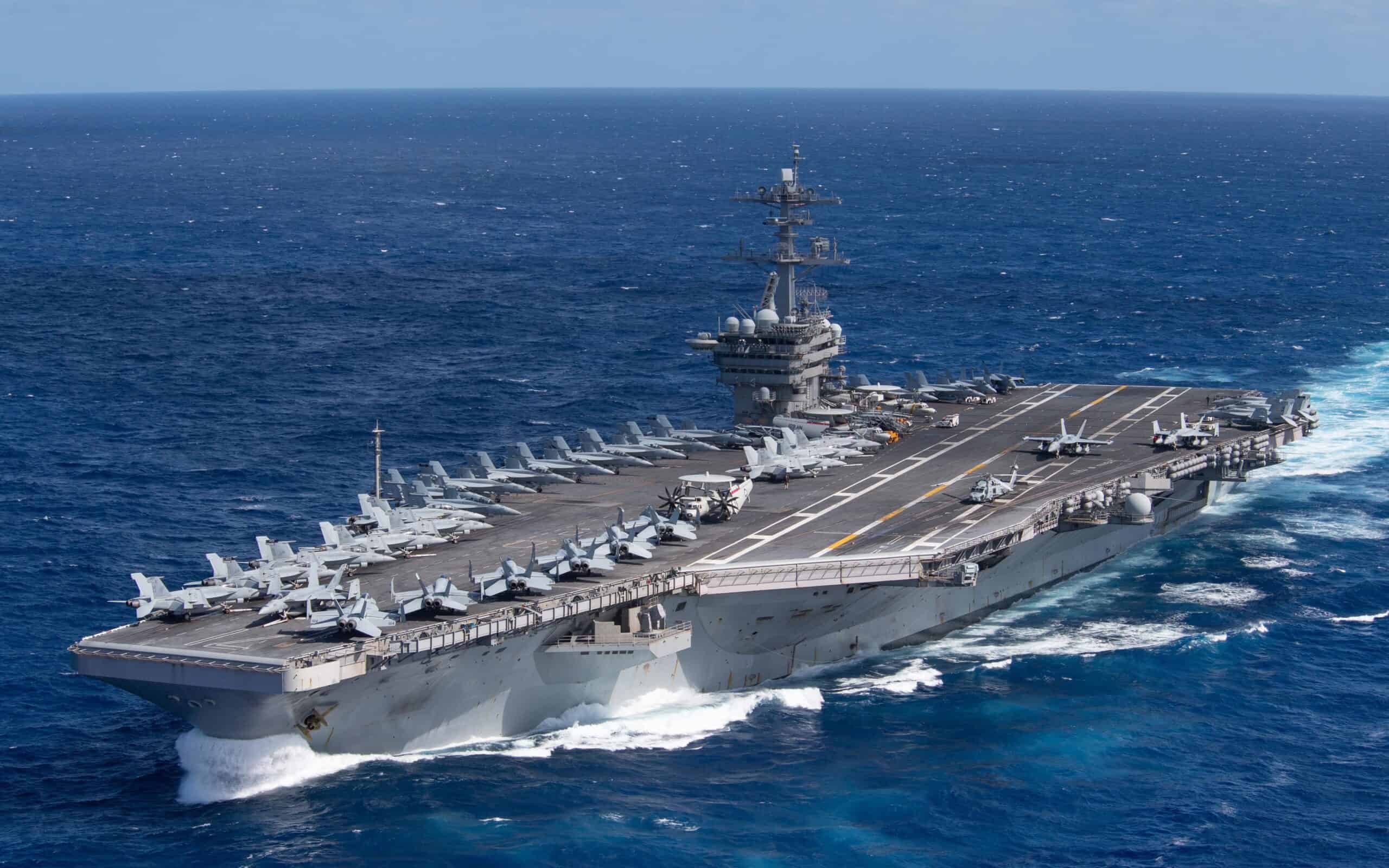
- Class: Nimitz
- Commissioned: October 25, 1986
- Service life: 36 years, 8 months, and 25 days
- Status: Stationed at Naval Air Station North Island, San Diego, California
27. CVN-72 Abraham Lincoln
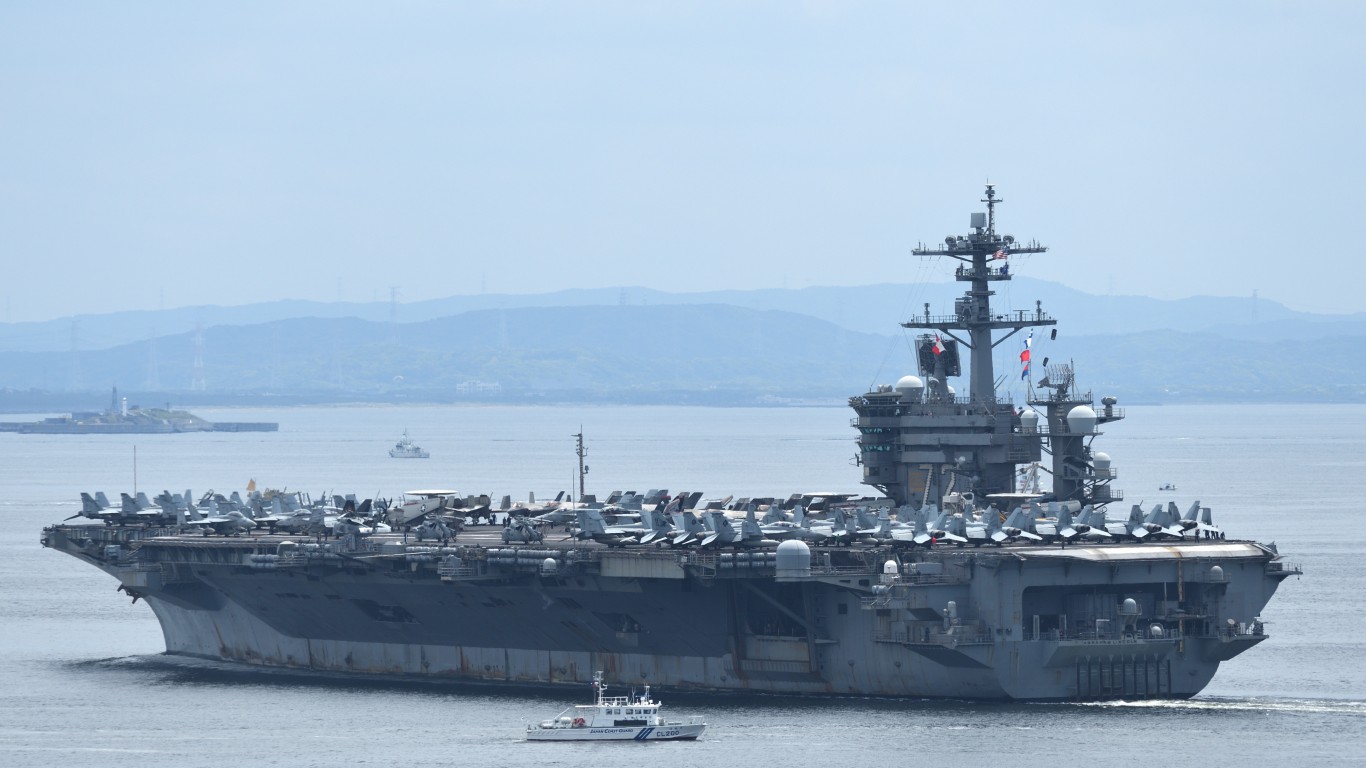
- Class: Nimitz
- Commissioned: November 11, 1989
- Service life: 33 years, 8 months, and 9 days
- Status: Stationed at Naval Station Norfolk, Norfolk, Virginia
28. CVN-73 George Washington
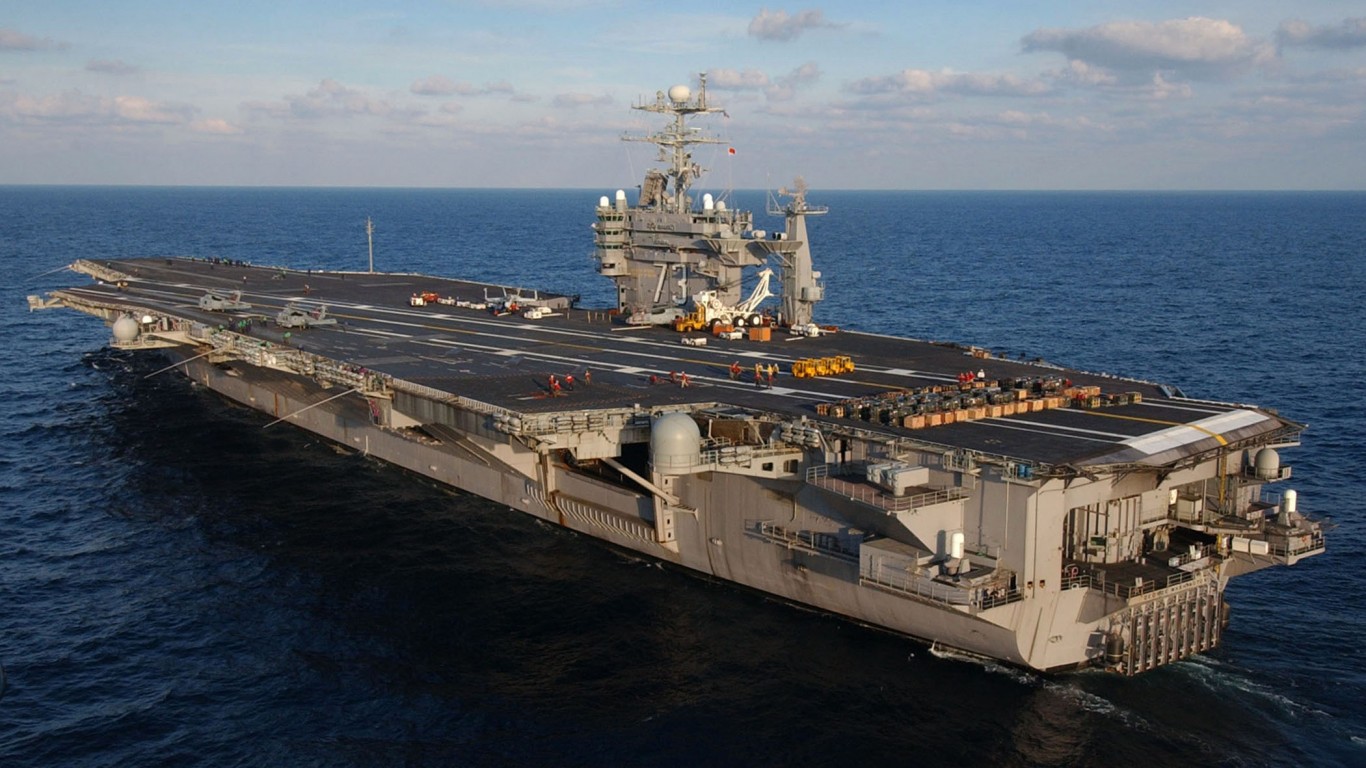
- Class: Nimitz
- Commissioned: July 4, 1992
- Service life: 31 years and 16 days
- Status: Stationed at Naval Station Norfolk, Norfolk, Virginia
29. CVN-74 John C. Stennis
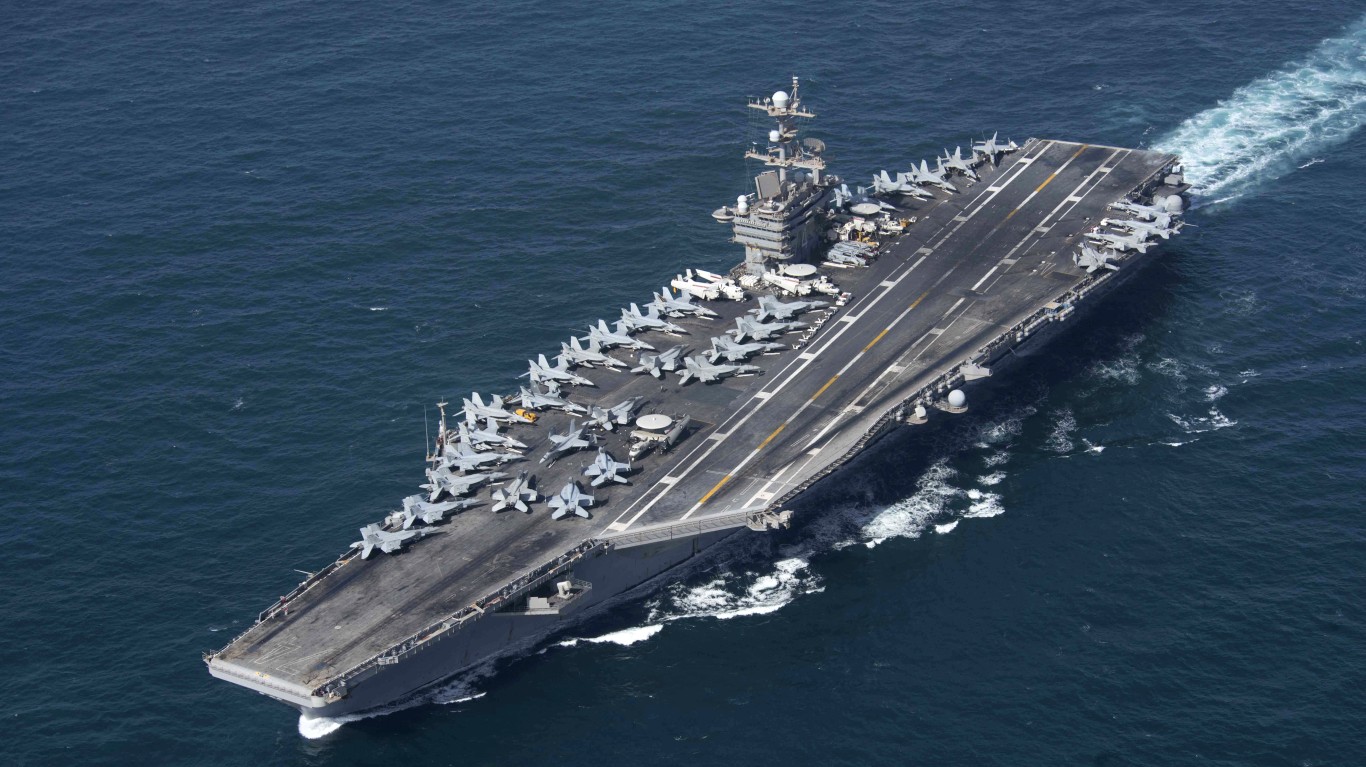
- Class: Nimitz
- Commissioned: December 9, 1995
- Service life: 27 years, 7 months, and 11 days
- Status: Stationed at Naval Base Kitsap, Bremerton, Washington
30. CVN-75 Harry S. Truman
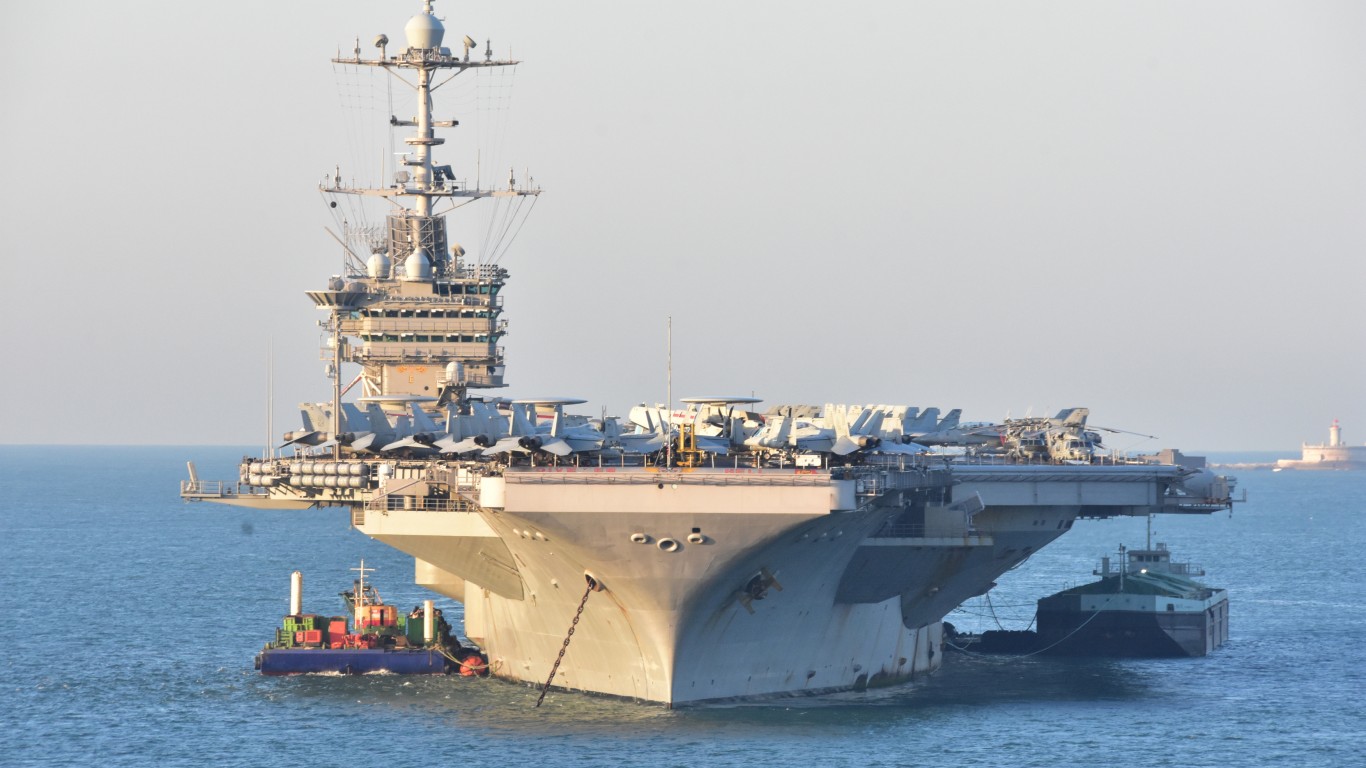
- Class: Nimitz
- Commissioned: July 25, 1998
- Service life: 24 years, 11 months, and 25 days
- Status: Stationed at Naval Station Norfolk, Norfolk, Virginia
31. CVN-76 Ronald Reagan
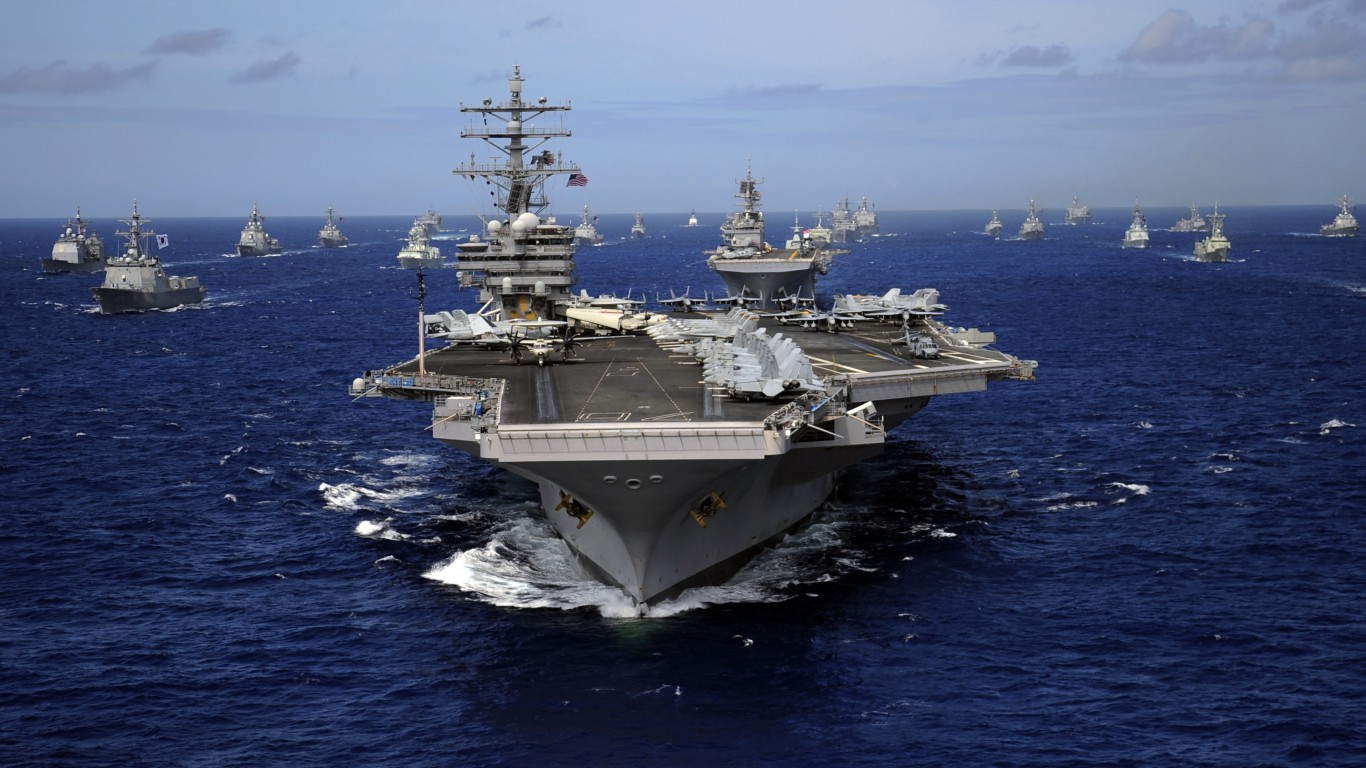
- Class: Nimitz
- Commissioned: July 12, 2003
- Service life: 20 years and 8 days
- Status: Stationed at Yokosuka Naval Base, Yokosuka, Japan
32. CVN-77 George H.W. Bush
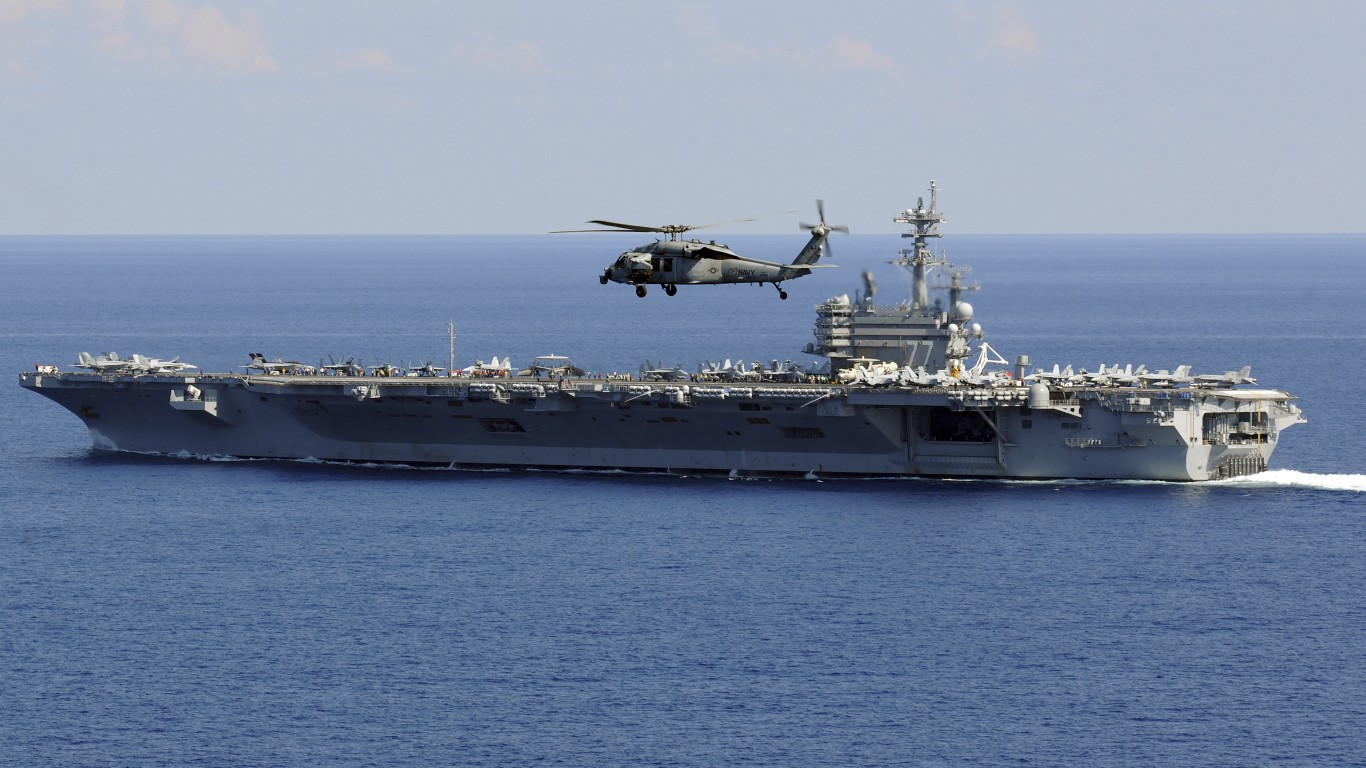
- Class: Nimitz
- Commissioned: January 10, 2009
- Service life: 14 years, 6 months, and 10 days
- Status: Stationed at Naval Station Norfolk, Norfolk, Virginia
33. CVN-78 Gerald R. Ford

- Class: Gerald R. Ford
- Commissioned: July 22, 2017
- Service life: 5 years, 11 months, and 28 days
- Status: Stationed at Naval Station Norfolk, Norfolk, Virginia
Is Your Money Earning the Best Possible Rate? (Sponsor)
Let’s face it: If your money is just sitting in a checking account, you’re losing value every single day. With most checking accounts offering little to no interest, the cash you worked so hard to save is gradually being eroded by inflation.
However, by moving that money into a high-yield savings account, you can put your cash to work, growing steadily with little to no effort on your part. In just a few clicks, you can set up a high-yield savings account and start earning interest immediately.
There are plenty of reputable banks and online platforms that offer competitive rates, and many of them come with zero fees and no minimum balance requirements. Click here to see if you’re earning the best possible rate on your money!
Thank you for reading! Have some feedback for us?
Contact the 24/7 Wall St. editorial team.
